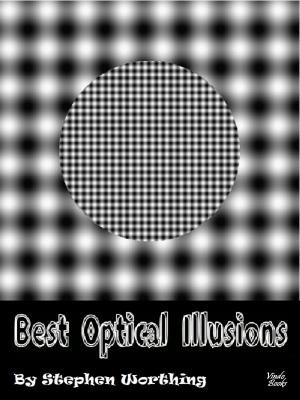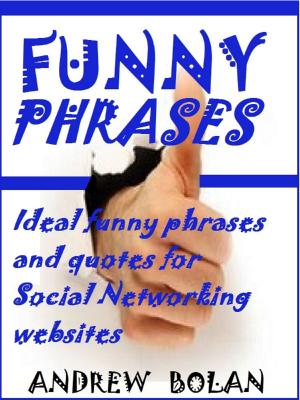Misconceptions False Facts
Nonfiction, Entertainment, Theatre, Comedy, Humour & Comedy, General Humour| Author: | Janette Soleman | ISBN: | 1230000191286 |
| Publisher: | Vindo Books | Publication: | October 17, 2013 |
| Imprint: | Language: | English |
| Author: | Janette Soleman |
| ISBN: | 1230000191286 |
| Publisher: | Vindo Books |
| Publication: | October 17, 2013 |
| Imprint: | |
| Language: | English |
There are thousands of wives' tales we hear at random times, especially when we are young, and we tend to believe them as adults, and pass them on again to children... an endless cycle of false facts being passed through generations. This book puts a stop to this!
We know people offer advice with good intentions, but a majority of this advice and beliefs are actually incorrect. This book specializes in misconceptions, so the next time someone tells you something, you can correct them.
Examples:
Sugar does not cause hyperactivity in children. Double-blind trials have shown no difference in any behavior between children given sugar-full or sugar-free diets, even in studies specifically looking at children with attention-deficit/hyperactivity disorder or children considered sensitive to sugar.
Cannabis can kill you if you overdose. Wrong. From animal studies, an average human would need to ingest over a kilogram of cannabis to die of an overdose.
A penny dropped from the Empire State Building cannot kill a person or crack the sidewalk. The terminal velocity of a falling penny is about 30–50 miles per hour, and the penny will not exceed this speed regardless of the height from which it is dropped. At that speed, its energy is not enough to penetrate a human skull or cause a crack in concrete, as demonstrated in an episode of Mythbusters. As Mythbusters noted, the Empire State Building is a particularly poor setting for this myth, since its tapered shape would make it impossible to drop anything directly from the top to street level.
A peanut is not a nut in the botanical sense, it's from the legume family (the bean family), though of course people with an allergy to nuts should never eat peanuts.
There is no evidence that Vikings wore horns on their helmets. In fact, the image of vikings wearing horned helmets stems from the scenography of an 1876 production of the Der Ring des Nibelungen opera cycle by Richard Wagner.
Artificial sweeteners cause cancer. This is an erroneous misconception that has regularly shown up in news headlines since the 1970s because of a 1969 study on the effects of cyclamate on mice. It was later disclosed that the mice had been given the cyclamate equivalent of 800 cans of diet soda per day for several weeks. No studies observing moderate amounts of artificial sweeteners have shown that it can lead to cancer. Artificial sweeteners are discussed because it is the most prevalent food myth but it applies to many other kitchen goods from coffee to broccoli to even water (specifically the fluoride content in water). Just as in the artificial sweeteners situation, too much of anything could lead to cancer, but it requires an excessive amount of the product to be potentially hazardous.
Reading in poor light ruins your eyes. Parents often say to children reading under the covers or by moonlight will ruin your eyesight. Reading in dim light can strain your eyes, because you tend to squint, and that may give you a headache. But you won’t do any permanent damage to your eye sight, except maybe cause crow’s-feet as you age. Your overtired eyes can get dry and achy, and this might make your vision seem less clear, but a good night’s rest helps your eyes recover just fine.
Contents:
Food and Cooking
Words and Phrases
Astronomy
Biology
Evolution
There are thousands of wives' tales we hear at random times, especially when we are young, and we tend to believe them as adults, and pass them on again to children... an endless cycle of false facts being passed through generations. This book puts a stop to this!
We know people offer advice with good intentions, but a majority of this advice and beliefs are actually incorrect. This book specializes in misconceptions, so the next time someone tells you something, you can correct them.
Examples:
Sugar does not cause hyperactivity in children. Double-blind trials have shown no difference in any behavior between children given sugar-full or sugar-free diets, even in studies specifically looking at children with attention-deficit/hyperactivity disorder or children considered sensitive to sugar.
Cannabis can kill you if you overdose. Wrong. From animal studies, an average human would need to ingest over a kilogram of cannabis to die of an overdose.
A penny dropped from the Empire State Building cannot kill a person or crack the sidewalk. The terminal velocity of a falling penny is about 30–50 miles per hour, and the penny will not exceed this speed regardless of the height from which it is dropped. At that speed, its energy is not enough to penetrate a human skull or cause a crack in concrete, as demonstrated in an episode of Mythbusters. As Mythbusters noted, the Empire State Building is a particularly poor setting for this myth, since its tapered shape would make it impossible to drop anything directly from the top to street level.
A peanut is not a nut in the botanical sense, it's from the legume family (the bean family), though of course people with an allergy to nuts should never eat peanuts.
There is no evidence that Vikings wore horns on their helmets. In fact, the image of vikings wearing horned helmets stems from the scenography of an 1876 production of the Der Ring des Nibelungen opera cycle by Richard Wagner.
Artificial sweeteners cause cancer. This is an erroneous misconception that has regularly shown up in news headlines since the 1970s because of a 1969 study on the effects of cyclamate on mice. It was later disclosed that the mice had been given the cyclamate equivalent of 800 cans of diet soda per day for several weeks. No studies observing moderate amounts of artificial sweeteners have shown that it can lead to cancer. Artificial sweeteners are discussed because it is the most prevalent food myth but it applies to many other kitchen goods from coffee to broccoli to even water (specifically the fluoride content in water). Just as in the artificial sweeteners situation, too much of anything could lead to cancer, but it requires an excessive amount of the product to be potentially hazardous.
Reading in poor light ruins your eyes. Parents often say to children reading under the covers or by moonlight will ruin your eyesight. Reading in dim light can strain your eyes, because you tend to squint, and that may give you a headache. But you won’t do any permanent damage to your eye sight, except maybe cause crow’s-feet as you age. Your overtired eyes can get dry and achy, and this might make your vision seem less clear, but a good night’s rest helps your eyes recover just fine.
Contents:
Food and Cooking
Words and Phrases
Astronomy
Biology
Evolution















